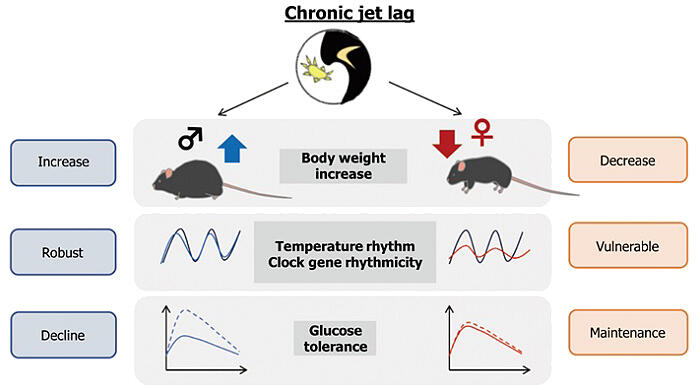In today's society, where people can be active day and night, it has become easy for life patterns to be disrupted. Experiencing jet lag for long periods has been known to increase health risks in animals. However, it is not known if there are sex differences in the association between circadian clock disruption and health. This is because male animals have primarily been used in previous studies. Therefore, a detailed study was necessary to determine if the susceptibility to circadian clock disruption differs between sexes.
A research team led by Professor Shinobu Yasuo of the Faculty of Agriculture at Kyushu University conducted experiments to induce a chronic jet lag state in mice by shifting the light-dark cycle over a long period. The research team discovered that female mice were more prone to circadian clock disruption than male mice. After the chronic jet lag treatment, the body weight increased in male mice, whereas it decreased in female mice, compared to that in the control group. The team analyzed the expression of glucose and lipid metabolism-related genes in the liver and various physiological indices and found decreased glucose tolerance and increased plasma insulin levels only in male mice. Furthermore, they conducted experiments to clarify the role of testosterone, a male hormone derived from the testes. The experiments showed that castrated male mice lost weight and maintained glucose tolerance, just like female chronic jet lagged mice. Administration of testosterone to male mice restored the male-specific robustness of the circadian clock, indicating that testosterone is involved in the sex dependence of the circadian clock.
These results highlight the importance of considering gender differences in the health management of shift workers who have irregular lifestyles, such as healthcare professionals. Aside from the light-dark environment, humans must consider other influential factors, such as dietary habits and stress. Predictably, these factors might interact with the circadian clock in a gender-dependent manner. Hopefully, these findings will lead to the development of appropriate coping strategies based on gender-dependent circadian clock disruption.
Effects of chronic jet lag on mice





